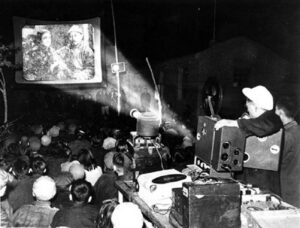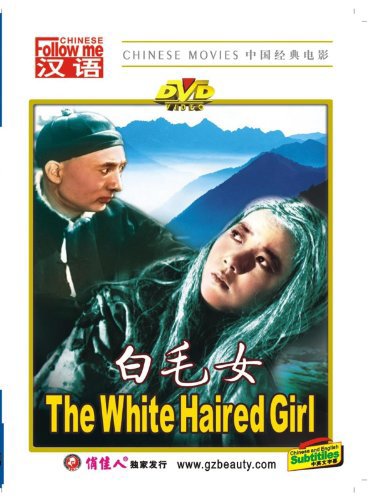1952 Jincheng Village, Heilongjiang, China
Li Weizhi
1938
Jincheng Village, Heilongjiang, China
Interviewed on February 9th, 2022
by Sophia Zhuang

The first time I saw a film, it was not in a theater, but instead in the outdoors. They hung up a white cloth and projected the film onto this makeshift screen in the field of a local school. My village was centrally located in this area of Shuangcheng District, so all the people from neighboring villages came to see the film as well. I think there must have been from 100 to 200 people! We brought little wooden stools to sit on, and it was a big gathering—like Chinese New Year.
I came with my family, and all the parents were worried about holding on to their children in case they got lost in the crowds. There were security guards and police officers who were helping to keep the peace and organize everyone. Little by little, we pushed forwards to try and get a better view of the screen.

The first movie I remember seeing was The White Haired Girl《白毛女》(1951) when I was about 14 or 15. It was the story of a peasant girl Xi’er whose father was a tenant farmer and took out a loan from his landlord Huang Shiren. However, he was unable to pay back the debt. Huang Shiren killed Xi’er’s father and kidnapped her to be his concubine. When this happened, all the kids were so emotional, we started crying!
Eventually, Xi’er was able to escape and she hid in the mountains. However, she was so malnourished that her hair turned white, and hence the name of the movie. Before being taken, Xi’er had been engaged to Dachun. Dachun kept looking for her and years after she went missing, he was able to locate her in the mountains and save her. When this happened, I was so relieved that I started tearing up again. In those days, as children, it was so easy for us to cry when watching these films!
Before watching this film, I had heard bits about the storyline from friends and neighbors; when I actually saw the movie, it surpassed my expectations—It was so much better than anything I imagined! The actors’ experiences and emotions all seemed so realistic.
At the local film projection, they sold snacks like tanghulu (fruit covered in hard candy) and corn, but I didn’t have any money to buy them. I remember seeing other kids who were better off than me eating snacks, and I was so jealous. All I wanted was for someone to buy me a yummy snack to eat while I watched the movie. In this time period, the common people didn’t have to pay to see films, as this was covered by the village/municipality.
I had two older sisters, two older brothers, and one younger sister; my parents didn’t support education for girls, so even though I wanted to study, I couldn’t afford to buy pencils and supplies (much less snacks at a local film). I was able to go to elementary school, because it was covered by the government, but when it came time for middle school, trying to get an education was much harder.
My middle school was not close to home, so in the beginning of the week, I would bring a little bit of food for the whole week. However, by the end of the week, the food would spoil with mold that was all shades of green and red. Out of embarrassment, I would sneak to the back of the school out of sight of my peers and eat it. At a certain point, my hair started turning brittle and yellow because of the lack of nutrition—I think I was almost becoming like the white haired girl myself! My teachers noticed, and the seven of them all donated two yuan each so that I could have some money to get through my last semester of schooling. Those teachers really looked after me and treated me so well. Years later, I went to professional teaching school, and when I had a little bit of my own money, I came back to see and repay them.
Interviewer’s note: I really appreciated the opportunity to interview my grandmother, Li Weizhi, for this project. She really doesn’t remember much from her upbringing, but the fact that she was able to retell this experience was really special. I am honored to have been able to capture her story.
